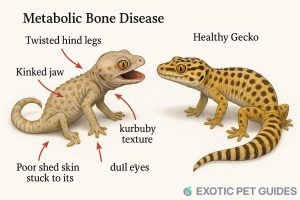How to Spot, Prevent, and Treat Health Issues in Your Pet Gecko
Geckos may be hardy and low-maintenance compared to many other pets, but like all reptiles, they can still develop health issues—some of which can turn serious if not addressed promptly. Whether you’re caring for a Leopard Gecko, Crested Gecko, Tokay Gecko, or any other species, understanding the most common gecko illnesses is key to keeping your pet healthy and thriving.
Let’s explore the warning signs, causes, and treatments of the most frequent gecko ailments, and how you can prevent them with proper care.

🧠 Why Geckos Get Sick
Geckos become ill for a variety of reasons, including:
- Improper diet
- Incorrect habitat conditions (temperature, humidity)
- Stress
- Infections or parasites
- Lack of veterinary care
In captivity, most illnesses are preventable with the right setup and attentive care.
🛑 8 Common Gecko Illnesses
1. Metabolic Bone Disease (MBD)
Cause: Calcium and vitamin D3 deficiency
Symptoms:
- Weak or soft jaw
- Curved or swollen limbs
- Lethargy or tremors
Treatment:
Immediate calcium and D3 supplementation, proper UVB lighting (for species that require it), and dietary correction. MBD can be irreversible if untreated for too long.
2. Impaction
Cause: Ingesting substrate or undigestible items (e.g., sand, bark), oversized food
Symptoms:
- No bowel movements
- Bloated abdomen
- Lethargy, dragging hind legs
Treatment:
Warm soaks, gentle belly massages, and possible veterinary intervention. Avoid loose substrates and always feed appropriately sized prey.
3. Respiratory Infections
Cause: Cold or damp enclosure, poor ventilation
Symptoms:
- Wheezing, bubbling at the nose
- Open-mouth breathing
- Loss of appetite, sluggishness
Treatment:
Increase temperatures, improve ventilation, and seek vet care for antibiotics if symptoms persist.
4. Parasites (Internal or External)
Cause: Contaminated food, unclean environments
Symptoms:
- Diarrhea
- Weight loss
- Visible mites or worms in feces
Treatment:
Veterinary diagnosis with a fecal test and appropriate deworming or anti-parasitic medication.
5. Shedding Problems (Dysecdysis)
Cause: Low humidity or dehydration
Symptoms:
- Retained skin around eyes, toes, or tail
- Cracked or patchy skin
Treatment:
Provide a moist hide, mist more frequently, or use a shedding aid. Manually remove retained shed with caution using damp cotton swabs.
6. Mouth Rot (Stomatitis)
Cause: Bacterial infection from injury, poor diet, or dirty enclosure
Symptoms:
- Swollen, red, or bleeding gums
- Refusal to eat
- Pus or discharge near the mouth
Treatment:
Veterinary care is needed—usually involves cleaning the mouth and administering antibiotics.
7. Tail Loss (Autotomy)
Cause: Stress, rough handling, or predator threat
Symptoms:
- Sudden detachment of tail
Treatment:
Keep the area clean to prevent infection. Geckos can regrow their tails, though the new one may look different.
8. Anorexia or Starvation
Cause: Illness, stress, improper temperature, or impaction
Symptoms:
- Refusal to eat
- Rapid weight loss
- Prominent spine or hip bones
Treatment:
Rule out illness or environmental stressors. Use appetite stimulants or consult a reptile vet.

🧼 Prevention Is the Best Cure
Most gecko illnesses are preventable with proper husbandry. Here’s how to keep your gecko healthy year-round:
- ✅ Provide correct temperature and humidity for the species
- ✅ Offer a balanced, gut-loaded diet with calcium and vitamin supplements
- ✅ Use clean, safe substrate to prevent impaction
- ✅ Monitor shedding and hydration regularly
- ✅ Keep the enclosure clean and stress-free
- ✅ Schedule annual checkups with a reptile veterinarian
🩺 When to See a Vet
If your gecko shows any of the following signs, contact a reptile veterinarian promptly:
- Not eating for more than 10 days
- Rapid weight loss
- Breathing difficulties
- Swollen or discolored limbs
- Open wounds or discharge
- Inability to shed completely
Early intervention is crucial for a full recovery.
📌 Final Thoughts
Geckos are wonderful pets, but they depend on you to keep their environment healthy and stress-free. By understanding the most common gecko illnesses—and knowing what to look for—you can catch problems early, provide better care, and enjoy many healthy years with your reptilian companion.
